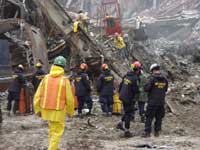“Human beings will never cooperate. War and fighting are part of our very make-up. We’re competitive, violent animals.” That’s what the cynics say, and sometimes it seems as though there is plenty of evidence to support their case. The recent attacks on New York and Washington. Bosnia. Rwanda. Over-fished oceans and over-harvested forests. Fights over water-use rights. Energy production in one region that leads to acid rain in another. You can add to the list. Let’s face it. Cooperation just isn’t our strength.
This is a depressing message, at a time when we are probably going to have to cooperate or literally die trying. We’re polluting our oceans and atmosphere and wiping out species. Various parts of the world face food shortages, water shortages, diseases that are getting resistant to antibiotics, and pests that are getting resistant to pesticides. I don’t think any of these problems are unsolvable, but most of the solutions I can think of are going to take cooperation. Sometimes at the level of a neighborhood or watershed, sometimes at the level of the whole planet, we’re going to have to work together if we want our world to be livable.
Can we human beings, created by billions of years of struggle and competition, summon the will to cooperate, even to save ourselves?

Rescue workers at Ground Zero.
Photo: Mike Rieger, FEMA.
If you can open yourself to look, I think you will find plenty of evidence that we can. Look at the response to the destruction in New York. In the rescue workers, the blood donors, and the hundreds of volunteers, you see the fundamental human impulse to help others, sometimes at enormous personal risk.
Our everyday worlds are full of cooperation, too. Think of everything you do in a day that would be impossible if we did nothing but compete — driving safely through a traffic light, depositing money in a bank, eating food that someone else has grown, drinking water that comes through community pipes. Maybe we are better at cooperating than we think.
Certainly, cooperation is as much a part of our evolutionary heritage as competition. Sometimes survival of the fittest has meant survival of the cooperators.
Once, for instance, about one and a half billion years ago, two separate, single-celled organisms, something like modern bacteria, united to form a new, more complex kind of cell. It is likely that at first the relationship was competitive — the bigger ate the smaller, or the smaller invaded the larger. Then, somehow, the two discovered how to cooperate. The engulfed cell provided efficient ways to release energy from scarce food. The larger cell may have protected the smaller, or maybe it was better at finding food.

Mitochondria might.
Image: The Biology Project.
We are the literal descendants of this cooperative event. The breakdown of nutrients to produce energy takes place inside compartments of our own cells. These compartments, called mitochondria, are the offspring of that original internalized organism. After countless generations of cooperative living inside larger creatures, including us, mitochondria still resemble tiny bacteria and still contain their own DNA.
No one doubts that the forces of competition have shaped us. Our eyesight was sharpened in the struggle to spot food and avoid danger. Strong muscles helped our ancestors outrun predators. But the story of the mitochondria reminds us that our eyes and muscles are also made of cells that have been practicing collaboration for more than a billion years.
The mitochondria aren’t the only cooperative venture in life’s history, either. In plants, photosynthesis takes place within chloroplasts, which are, like mitochondria, descendants of ancient internalized microorganisms. Multicellular organisms emerged out of cooperation, with cells giving up some independence to take on specialized roles and share resources.
Believing in the possibility of cooperation between neighbors and nations takes courage. Advocates for cooperation tend to be called naive or foolish. If you speak up for the possibility of cooperation you will be told again and again, “those people just can’t be trusted to cooperate.” Believing in the possibility of cooperation is a choice that will make you want to weep sometimes at the distance between the possibility and the reality.
But what other choice do we have? Believing that cooperation is impossible is a self-fulfilling prophecy that can only lead to more violence, more fights over dwindling resources, more and more crises passed on to our children.
So I am holding out for the possibility of a new level of cooperation in our world, and I find that the story of the mitochondria makes this faith a little easier to sustain. When people explain why cooperating is impossible I listen patiently, but I remember that even the cells of a cynic contain thousands of mitochondria.


